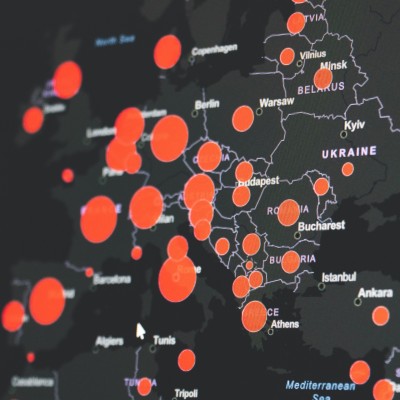
Open letter: Effect of COVID-19 on Creative Europe and the European CCS
The coronavirus has affected all countries in Europe, and it is already evident that the cultural sector is and will be heavily impacted. We stand in solidarity with every person and organisation that are affected by the virus not only in Europe but also elsewhere in the world, and by the measures taken to contain it.
On behalf of international and European cultural networks, platforms and cultural organisations, Culture Action Europe wrote a joint letter on the 20th of March, 2020 to the Commissioner Gabriel and Members of Directorate-General for Education, Youth, Sport and Culture (DG EAC). As an active member of Culture Action Europe, IETM has contributed to and co-signed the letter.
The letter lists proposals regarding the ways to cope with the consequences of COVID-19 on Creative Europe and the European Cultural and Creative Sectors. You can download the letter or read its main content below:
Main Issues and Proposals
The diversity of the cultural and creative sectors and their activities calls for a multi-targeted approach to address the impacts being felt across the sectors due to COVID-19. A range of different possibilities should be open to cultural organisations benefiting from Creative Europe funding in order to provide the appropriate support and allow for fitting responses in the case of each organisation’s circumstances. Below, we outline the main areas at stake and put forward proposals that would help to support the cultural and creative sectors during this challenging time.
1. Flexibility measures
Eligibility period
For events that cannot take place within the originally foreseen eligibility period of a project or framework year:
→ Extend the eligibility period for projects and framework contracts with accordingly postponed project reporting deadlines
Examples for networks:
For networks in Year 3:
→ Prolong, the current framework by a period roughly corresponding to the period during which activities were not possible. Start (and end) Year 4 later accordingly
→ Permit the transfer of funds not used in Year 3 to be additionally used in Year 4
For networks in Year 4:
→ Prolong the eligibility period by a period roughly corresponding to the period during which activities were not possible
Eligibility of costs
For events that had to be cancelled but payments have already been made and related costs:
→ Make costs related to cancelled events and other cancelled activities eligible
→ Clarify the proof needed to show the eligibility of costs incurred
For freelancers, who are especially affected by the cancellation of events and other activities, as their sole income often depends on these activities:
→ Allow the eligibility of a “solidarity fee” that beneficiaries can offer as payment to freelancers who were already hired for cancelled events and activities
Replacement of activities
In the case of postponing events becoming increasingly difficult, due to the uncertainty and to a possible accumulation of events after the crisis:
→ Allow beneficiaries to replace events with other formats and activities more suited to the current situation (e.g. webinars, publications, videos) or with activities that can be carried out independently of the current situation (e.g. transferring unspent costs to developing an organisation’s financial sustainability)
Additional funding
For beneficiaries facing significant losses (due to the refund of tickets, participation fees etc.) and where costs incurred for postponed or cancelled events and other activities cannot be recovered
→ Provide the possibility to apply for additional funding to mitigate losses and support the rescheduling of events where appropriate
2. Call for the EU to support the Cultural and Creative Sectors
While public safety remains top priority, the European Cultural Networks, European Cultural Platforms and cultural organisations and its members stand in solidarity with artists and cultural operators affected by the emergency measures taken in light of the COVID-19 situation. The measures implemented are likely to overwhelm European theatres, museums, venues, archives, libraries, cultural heritage sites, cultural centres and other cultural and creative spaces reliant on audiences, visitors and participation, as well as the cultural ecosystem as such, creators, professionals, freelancers and SMEs who work within these practices, to support and technical staff. Without appropriate support measures, these decisions will have devastating economic and social impact on the sector. Whether employed or freelance, workers in the cultural and creative sectors, who are often in an already precarious situation, are facing a sudden and dramatic loss of income.
Therefore we would like to encourage you:
— To support our plea to the European institutions and national governments to adopt emergency measures that specifically and adequately support the sustainability of the cultural ecosystem – similarly to what is being planned for small businesses.
— To call on the European Commission to earmark part of the € 25 billion emergency package to Europe’s economy specifically for the cultural and creative sectors.
As the President of the European Commission, Dr Ursula von der Leyen, has announced in the press that the European Commission intends to be as flexible as possible, we very much hope that you can provide positive answers to our suggestions.
Signatories:
Culture Action Europe – www.cultureactioneurope.org
IETM – International network for contemporary performing arts www.ietm.org
The European Choral Association – Europa Cantat – europeanchoralassociation.org ECSA – European Composer and Songwriter Alliance – composeralliance.org/
European Cultural Foundation – www.culturalfoundation.eu
European Music Council – www.emc-imc.org
Circostrada Network – www.circostrada.org
NEMO – Network of European Museum Organisations – www.ne-mo.org
JMI – Jeunesses Musicales International – www.jmi.net
On the Move – www.on-the-move.org
FACE – Fresh Arts Coalition Europe – www.fresh-europe.org
EUROPA NOSTRA – also on behalf of other members of the European Heritage Alliance 3.3. www.europeanheritagealliance.eu
European Festivals Association (EFA) – www.efa-aef.eu
IN SITU – European Platform for Artistic Creation in Public Spaces – www.in-situ.info
EUNIC – EU National Institutes for Culture – www.eunicglobal.eu
ELIA, globally connected European network in higher arts education – www.elia-artschools.org
ENCC – The European Network of Cultural Centres – www.encc.eu
TEH – Trans Europe Halles – www.teh.net
EJN – Europe Jazz Network – www.europejazz.net
ERIH – European Route of Industrial Heritage – www.erih.net
FEDEC – European federation of professional circus schools – www.fedec.eu
AEC – Association Européenne des Conservatoires, Académies de Musique et Musikhochschulen- www.aec-music.eu
ENCATC, European Network on cultural management and policy – www.encatc.org International Music Council – www.imc-cim.org
Soluzionimuseali ims – soluzionimuseali.com
ACCR – Association des Centres culturels de rencontre – www.accr-europe.org
Future For Religious Heritage – www.frh-europe.org
European Concert Hall Organisation – www.concerthallorganisation.eu
European Association of Archaeologists www.e-a-a.org
The International Federation of Library Associations and Institutions (IFLA) https://www.ifla.org/
Cumulus International Association of Universities and Colleges in Art, Design and Media – www.cumulusassociation.org
International Music Council www.imc-cim.org
RESEO – European Network for Opera, Music and Dance Education www.reseo.org
ETC – European Theatre Convention www.europeantheatre.eu

